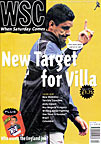 Dear WSC
Dear WSC
As a Wimbledon supporter I am often frustrated by the lack of a uniquely identifiable song, and some people might also feel the lack of a mascot. The fact that we have the best educated supporters in the country and our nickname of “Dons” set me thinking. For a mascot we could have a middle-aged man in a chalky tweed suit, gown and mortar board, carrying a large book, Plato’s Republic, or the Faerie Queene, say. As a special treat for the kiddies, perhaps he could recruit them for MI6 or the KGB over sherry. As for a song, the school song, Gaudeanus Igitur (Let them rejoice) would suffice. It would be particularly appropriate for its second verse with the lines “Vivat Academia, Vivat Professores”, loosely translated as “Long Live Academica, Come on You Dons”.I hope all Wombles will aid my campaign to make this song as famous as You’ll Never Walk Alone.
Aled Thomas, Cheltenham
 They may be rushing the exits at Loftus Road thse days but, as Anthony Hobbs explains, at least they're doing it in comfort thanks to an enigmatic stroller
They may be rushing the exits at Loftus Road thse days but, as Anthony Hobbs explains, at least they're doing it in comfort thanks to an enigmatic stroller
Littered around the country are grounds and bits of grounds bearing the name of a local hero. Preston have even put a picture of theirs on the seats in case you forget who he is. What fine tributes these are to the skills of past masters, lovingly constructed to ensure that the memory of a great player lives on long after he has gone.
 Jamie Rainbow takes a look at the latest football developments on the internet
Jamie Rainbow takes a look at the latest football developments on the internet
Ken Bates has made great play of the financial potential of Chelsea Football Club. They may not yet be the Manchester United of the south, but looking at the official club website, it seems only a matter of time before the off-the-field activities match their success on the field. Many of the club’s diverse range of activities are featured.
 Cris Freddi's examination of cheque book blunders continues our series looking at the worst of football in the 20th century
Cris Freddi's examination of cheque book blunders continues our series looking at the worst of football in the 20th century
Might as well get Stan out of the way: he was always going to feature here. At the time, it was hard to know how an individualist like that was going to fit into a passing team like Liverpool, and he didn’t really – you can say that despite a crashing goal on his debut and 26 in 81 league games. At Villa, of course, he’s simply been an embarrassment. “It was a surprise to me when he [Brian Little] signed Collymore. It was a shock given the problems he’d faced at Anfield and the problems he was having off the field.” (John Gregory, February 1999). Hard to think of £15.5 million worse spent. Even Paul Stewart’s various moves can’t compare.
 Despite a successful season, not everyone is impressed with Sunderland. Joe Boyle looks at how the club has reacted to accusations of racism in the stands
Despite a successful season, not everyone is impressed with Sunderland. Joe Boyle looks at how the club has reacted to accusations of racism in the stands
Perhaps Sunderland have had it a bit too good recently: top of the league by miles, a cup semi-final, a media-friendly boss, a superb, packed stadium and a favourable press.